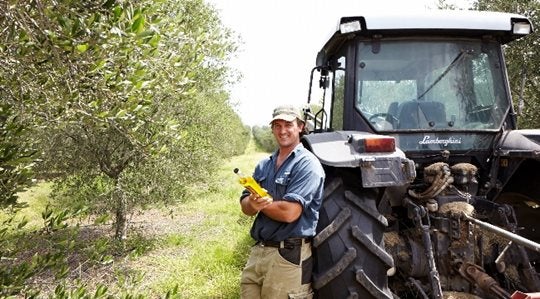Page
New case studies show mining and farming working together
The NSW Minerals Council is continuing its mining education initiative by launching a series of new case studies across NSW to show mining and farming working together.
These are first-hand accounts from farmers giving their perspective on the working relationships they have with local mines.
The first in this new series features olive farmer Andrew Waite who has grown olives in the Hunter Valley for more than 14 years and works with Glencore Xstrata at its Atulya olive grove near Singleton.
Glencore Xstrata owns Atulya Olive Grove, which shares land with the Bulga underground mine. So while our miners are producing coal underground, Andrew Waite is busy producing olives above it.
Atulya Olive Grove produces Frantoia and Correggiola olives, varieties originating from Tuscany. Last year 50 tonnes of olives were produced and processed locally for olive oils used for cooking.
“The mine has sold in the past to other growers to substitute their crops and increase their volume of production each year,” Andrew said.
“They’ve also helped out growers who have lost their crops in the past, so that they would maintain a crop, so it’s been beneficial for other growers in the area for that reason.”
Coupled with TV ads and www.landusefacts.com.au showing mining’s relatively small footprint in NSW, these new case studies aim to address some of the misconceptions about mining.
“NSW Mining’s education initiative aims to improve public understanding about mining and also respond to some of the misleading claims being made activists and extremists,\’ NSW Minerals Council CEO Stephen Galilee said today.
“From the amount of attention given to mining you could be forgiven for thinking that mines are engulfing NSW, but the reality is mining operations account for around 0.1% of the state’s land compared to 76% for agriculture.
“Modern mining delivers around 25% of NSW exports by value, around 85% of the State’s electricity needs and directly employs 80,000 people across the State in mining and minerals processing.
“Traditional mining practices have coexisted with agriculture and tourism for around 200 years and will continue to do so. We know mining does have an impact on the land it uses, and we work hard to manage these impacts, because coexistence between key industries in NSW is the only way to ensure local communities continue to grow and prosper.”
To find out which NSW coal mine is now also producing olive oil, go to www.worldclassminers.com.au.
Please join the conversation on Twitter using the hashtag #worldclassminers or like the World Class Miners Facebook page and have your say there.
Contact: Lindsay Hermes I lhermes@nswmin.com.au I 02 9274 1419

